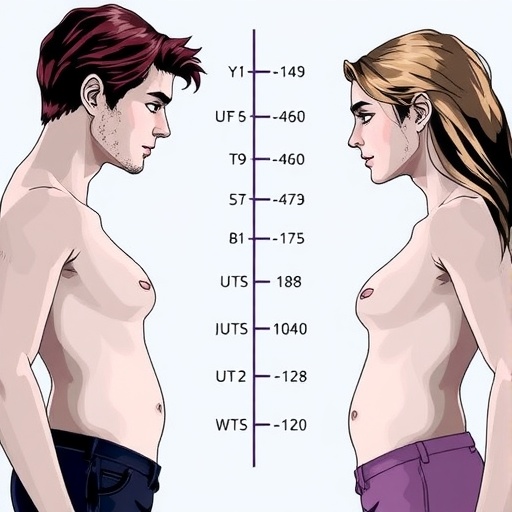In a groundbreaking study examining the profound effects of UGT deficiency, researchers have uncovered significant insights into the sexual dimorphism observed in metabolomic and phenotypic spectra. Conducted as part of the Canadian Longitudinal Study on Aging, this research sheds light on how UGT (UDP-glucuronosyltransferase) deficiency manifests differently in men and women, opening up a new frontier in our understanding of metabolic disorders and their implications for health.
UGT enzymes play a critical role in metabolizing various substances within the body, including drugs, hormones, and xenobiotics. The findings of this study indicate that the level of UGT activity can significantly differ between the sexes, which may account for varying responses to medications and susceptibility to diseases associated with UGT deficiency. By employing a large and diverse cohort, the study meticulously documented the metabolic profiles and health outcomes related to UGT activity across different genders.
The implications of sexual dimorphism in UGT deficiency are far-reaching. Traditionally, studies in pharmacology have not adequately accounted for gender differences, often leading to a one-size-fits-all approach in drug administration and treatment protocols. The new data emerging from this research challenges this paradigm, pointing towards a necessity for gender-specific considerations in medical practice. The researchers advocate for tailored therapeutic strategies that acknowledge these fundamental biological differences to optimize health outcomes.
The participants of the Canadian Longitudinal Study on Aging were carefully selected to represent a broad spectrum of ages and health backgrounds, allowing for a comprehensive analysis of UGT-related health issues in older adults. Through a combination of biochemical assays, questionnaires, and health assessments, the study was able to correlate UGT deficiency with various health markers, which included liver function, hormonal levels, and overall metabolic health.
One of the most striking attributes of this research is its focus on the potential causes of sexual dimorphism observed in UGT activity. Factors such as genetic predispositions, hormonal influences, and environmental exposures were carefully examined to reveal how they interact uniquely in men and women. The interplay between these variables is essential in understanding why certain conditions manifest differently, which could lead to more effective screening and prevention strategies for metabolic diseases.
Furthermore, the study touches on the significant role of lifestyle choices in the context of UGT deficiency. Diet, exercise, and exposure to toxins were all shown to influence metabolic pathways related to UGT activity. These findings underscore the importance of holistic approaches in healthcare that consider lifestyle factors alongside genetic and biological differences between sexes. By integrating this knowledge into public health initiatives, there is potential to enhance health promotion efforts tailored for both men and women.
The statistical analyses employed in the study provide robust evidence supporting the specific findings on UGT’s sexual dimorphism. Utilizing advanced statistical methodologies, the researchers were able to dissect the nuances of UGT activity and metabolic outcomes, offering a more nuanced understanding of how gender impacts health trajectories in aging populations. This scientific rigor also contributes to the credibility of the study, reinforcing the need for continued research into the genetic and enzymatic pathways involved.
Moreover, the results of this study illuminate the urgent need for further investigation into how UGT deficiencies can lead to adverse outcomes, such as increased susceptibility to certain diseases or compromised metabolic health. Identifying individuals at risk could ultimately pave the way for tailored preventative measures and interventions that are gender-sensitive, targeting high-risk populations effectively.
As more scientists and healthcare practitioners become aware of the differences highlighted in this research, it is expected that clinical practices will evolve. Physicians may begin to assess UGT levels as a routine part of metabolic assessments, integrating these insights into diagnostic and treatment frameworks. This change could enhance the standardization of care while fostering a more personalized approach to patient treatment.
Additionally, the compelling findings from this research offer a fertile ground for future studies. Investigating how lifestyle interventions, such as diet and exercise, can modulate UGT activity could have significant implications for public health strategies aiming to combat metabolic syndromes. As healthcare continues to move towards personalizing medicine, these insights could play a crucial role in shaping new guidelines and recommendations.
The implications of this research extend into educational realms as well, raising awareness among both healthcare providers and the general public about the intricacies of UGT deficiency. There is a vital need for educational campaigns that inform individuals about the importance of recognizing the signs of metabolic disorders, particularly in light of emerging evidence about gender differences. Knowledge dissemination will empower patients to engage proactively in their health management.
In conclusion, the study led by Rivera-Herrera et al. marks a significant milestone in understanding UGT deficiency and its differential effects based on sex. By uncovering the relationships between UGT enzyme variability and health outcomes, the research paves the way for more informed, gender-specific strategies in medicine. This research not only enhances our scientific knowledge but also establishes a crucial framework for future inquiries aimed at further unraveling the complexities of metabolism and health disparities.
As we await more disclosures from additional studies built upon these findings, one thing becomes increasingly clear: recognizing and addressing sexual dimorphism in health-related inquiries is imperative. The future of metabolic research and personalized healthcare lies in this understanding, promising a trajectory that leads to safer, more effective medical interventions tailored to the needs of every individual.
Subject of Research: UGT deficiency and its sexual dimorphism in metabolomic and phenotypic spectra.
Article Title: Sexual dimorphism in metabolomic and phenotypic spectra of UGT deficiency: findings from the Canadian Longitudinal Study on Aging.
Article References:
Rivera-Herrera, A.L., Rouleau, M., Singbo, M. et al. Sexual dimorphism in metabolomic and phenotypic spectra of UGT deficiency: findings from the Canadian Longitudinal Study on Aging.
Biol Sex Differ 16, 26 (2025). https://doi.org/10.1186/s13293-025-00708-5
Image Credits: AI Generated
DOI: 10.1186/s13293-025-00708-5
Keywords: UGT deficiency, sexual dimorphism, metabolomics, Canadian Longitudinal Study on Aging, health disparities, personalized medicine, metabolic health, pharmacogenomics.




